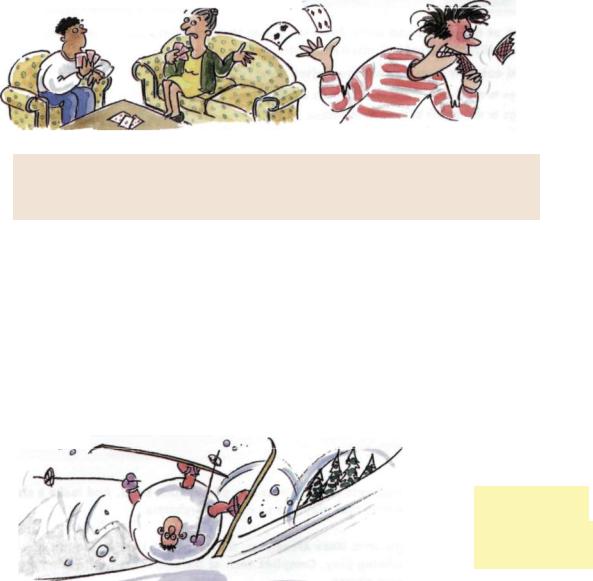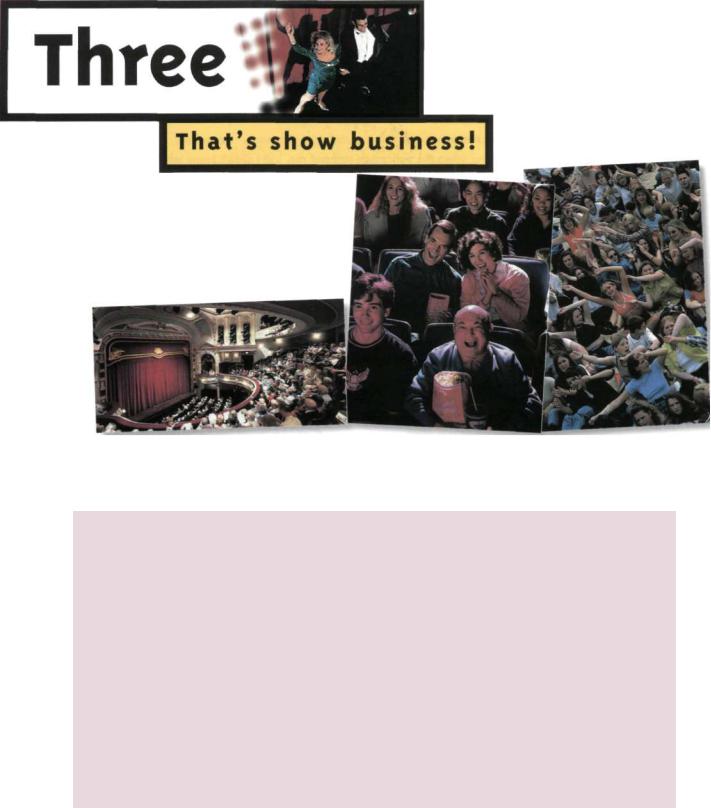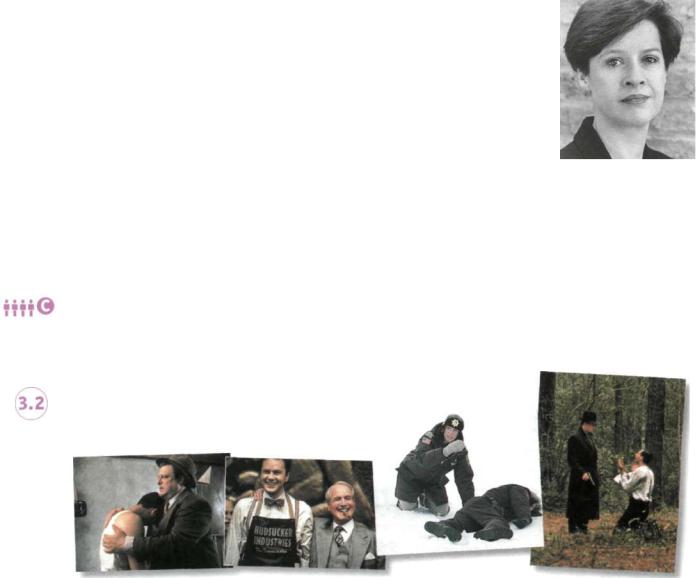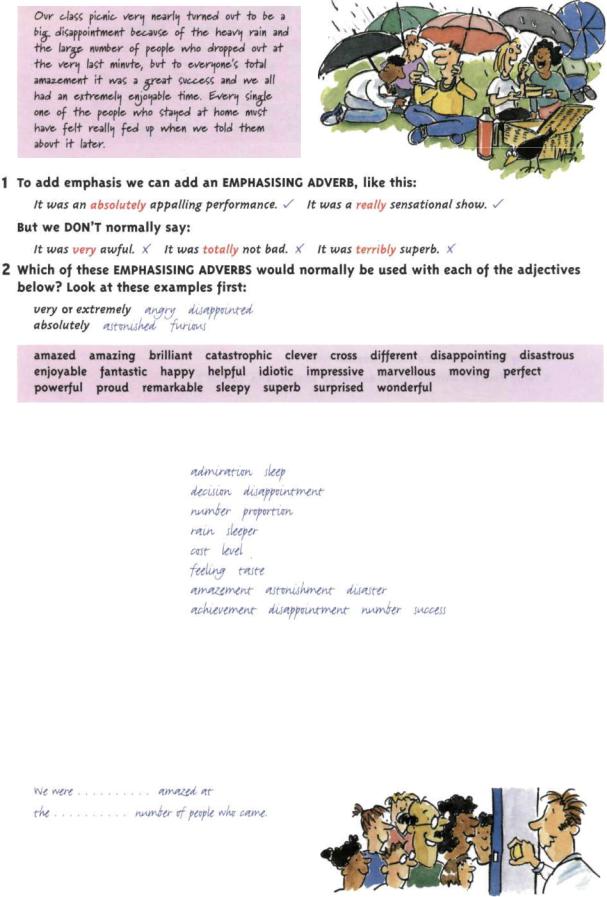
English_books / Adv_eng
.pdf
Really? That's amazing!
Speaking
You'll hear 15 short extracts, in which people are reacting to a piece of information or news that a friend gives them. Interpret the reactions by noting the number in one of the spaces.
surprised: • • interested: • • disappointed: • annoyed: • pleased: •
1 Arrange the phrases in the middle to show which of the eight REACTIONS they would normally express. Some of them can express more than one reaction.
ANNOYANCE
DISAPPOINTMENT
EXCITEMENT
INTEREST
That's amazing! |
|
How annoying! |
How infuriating! |
|
What a nuisance! |
What a pity! |
|
Phew! |
That is good news! |
|
Thank heavens! |
Good lord! |
|
I am pleased! |
Fancy that! |
|
Oh dear! |
Thank goodness! |
|
Fantastic!! |
How interesting! |
|
How exciting! |
Really! |
|
What a shame! |
That's wonderful! |
|
That's a relief! |
|
|
|
PLEASURE
RELIEF
SURPRISE
SYMPATHY
2Note down some other expressions that express the same reactions.
Listen to the second part of the recording and imagine that some friends are talking to you. React to each piece of news or information with an appropriate remark.
Many of the phrases in B can be used sarcastically as well as sincerely.
1 Make a list together of some of the following things. Use your imagination to invent some of these if necessary:
*your favourite colour, car, book, TV show, film, writer, song, piece of music, holiday resort, hobby, sport, animal, first name, country
*some things you're looking forward to AND some things you're dreading in the future
*some amazing AND annoying AND disappointing things that have happened recently
*some good news and some bad news
*the main turning points in your lives: what decisions and choices you've made and what happened as a result
2 join another pair and get them to react to your information and news'.
"For me? Ooooooooh! I love surprises!'

New Cambridge Advanced English
See the world?
Listening and Reading
You'll hear a broadcast about theme parks. Note down ONE main attraction of each place in the chart.
Theme park |
Main attraction |
Tokyo Disneyland |
|
|
|
Huis Ten Bosch, Nagasaki |
|
|
|
Sea Hawk Resort S Hotel, Fukuoka |
|
|
|
Carasunosato, Hiroshima |
|
|
|
Russian Village, Niigata |
|
|
|
Shingo-mura, Aomori Prefecture |
|
|
|
German Happiness Kingdom, Hokkaido |
|
|
|
Canadian World, Hokkaido |
|
|
|
Shakespeare Country, Marayuma |
|
|
|
Tobu World |
|
|
|
Epcot World Showcase, Florida, USA |
|
|
|
Two of you should look at Communication Activity 2, the others at 20. You'll each see the continuations of these two newspaper articles.
When you've read your article, find out what your partners have discovered by asking them questions. Discuss whether the same ideas could become popular in your country and why (not).
JAPANESE BEACH LOVERS BASK IN THEIR ARTIFICIAL ALL-WEATHER PARADISE
IT IS almost summertime in Japan, which means it is time to head for the beach. Not the gritty stretch that separates Japan from the ocean - a garbage dump and drag-race
strip combined, atop dark volcanic sand.
Instead, it is time to head for the indoor beach park, with its predictable waves, clean, rubberised, sandgrained flooring and perfect weather - rain or shine.
"It's the instant noodles of beaches," explains
....
Push-button lover
WHAT do video cassettes, ice cream, pizzas, whisky and bouquets of flowers all have in common? The answer is that in Japan they can all be bought from a vending machine. Japan boasts more vending machines per person than any other country in the world, with one for every 22 people. America, by contrast, has one for every 46; the European Community only one for every 200.
Japanese vending machines are also more productive. Sales per machine are almost two-
Find out what your partners know about the people who live in the various countries.you talked about in : their characteristics, habits and behaviour.
•Which countries are supposed to have the friendliest people, the tastiest food, the most beautiful scenery, and the easiest language to learn?
•Which nationalities do you have first-hand personal experience of?
Write an informal letter to a friend (about 250 words) telling him or her about the country you'd most like to visit and why you'd like to go there. Try to persuade your friend to go there with you during your next summer vacation.

Synonyms and opposites - 1
Word study
If someone asked you this question:
Would you be afraid if you were about to spend a year on a desert island?
would you reply like this: |
Afraid? No, I'd be absolutely petrified!! |
|
or like this: |
Afraid? No, but I suppose I would be a bit apprehensive. |
|
1 Some adjectives have similar meanings but have a different 'FORCE'.
Notice how these adjectives have been arranged in the chart to show their force.
AFRAID anxious apprehensive frightened nervous petrified scared scared stiff terrified uneasy worried
2Choose THREE of the following groups of adjectives and make similar charts to show the relative FORCE of the adjectives. Then add one more word to each of your charts, (if you need to use a dictionary to look up any words you don't know the meaning of, look carefully at the examples as well as the definitions.)
ANNOYED |
cross |
discontented |
dissatisfied |
furious grumpy |
indignant |
irritated |
|
|||
|
livid |
resentful |
upset |
|
|
|
|
|
||
SURPRISED |
amazed |
astonished |
horrified shocked |
stunned |
taken aback |
|
|
|||
CALM |
composed |
detached |
impassive indifferent relaxed serene unemotional |
|||||||
|
unmoved |
unruffled |
unworried |
|
|
|
|
|
||
HAPPY |
cheerful |
delighted |
exhilarated |
glad |
light-hearted on top of the world |
overjoyed |
||||
|
pleased as Punch |
satisfied thrilled |
|
|
|
|
||||
UNHAPPY |
dejected |
desperate |
disappointed discontented |
dissatisfied |
down in the dumps |
|||||
|
fed up |
feeling down |
feeling low |
heartbroken inconsolable |
miserable |
sorry |
||||
|
upset |
wretched |
|
|
|
|
|
|
|
|
1Make a list of things that might make you feel angry, happy, unhappy, excited, surprised or afraid.
2Ask your new partners to say how they would feel about the things in your list and ask them why.
Like this:
How would you feel if you saw a shark while you were swimming?
Why is that?
I'd be absolutely terrified!
Because I might get eaten by it!

New Cambridge Advanced English
You can't lose!
Verbs and idioms
Replace each phrase in red with the correct form of one the expressions from the list below.
1 We didn't have a map and so we couldn't find the right direction. 
2I'm sorry that I panicked when the policeman stopped me, but I didn't know what to say to him.
3I really enjoy getting thoroughly absorbed in a good book but this one is so dull that I'm no longer interested in it.
4I'm so glad you're back, we couldn't manage without you.
5I know you felt humiliated when you had to apologise, but don't worry too much about it.
6I don't want to stand too near the edge in case I start to fall.
770 million people were killed in the First and Second World Wars.
8The only way to become slimmer is to eat less; it's easy to become discouraged when other people are eating as much as they like.
9I was going to complain to the manager but in the end I didn't have the courage.
10 We used to correspond regularly but now we are no longer in contact.
11I couldn't remain calm with her when she refused to listen to my explanation and I quickly got angry with her.
12 He gets so upset when someone else is winning - I can't remember the number of times he has stormed
be at a loss be a bad loser be lost without lose count lose face |
lose heart lose interest |
|
lose one's balance |
lose one's head lose one's life lose one's nerve |
lose one's temper with |
lose one's way / |
lose oneself in lose patience lose touch (with) |
lose weight |
(not) lose any sleep over
Complete each sentence with a suitable expression from the list above:
1 They were enthusiastic at first, but they soon
2 Let's write to each other regularly - it would be a shame if we .
3 It's not as difficult as you think, try not to |
. |
4In some countries people will do anything to avoid
5In an emergency don't
6I'm sorry I'm late, I'm afraid I
7Just because someone doesn't understand, don't
8He said he could ski down the slope easily but half-way down he
Highlight the most useful new expressions (or other vocabulary) in this section.

Films, shows and concerts
Vocabulary and Listening
1Look at the photos and write down ten words that come into your mind when you think about different kinds of entertainment.
2Find out from your partners how often they:
•go to the cinema - and watch movies on television or on video
•go to the theatre or listen to live music
•listen to music on cassette or CD
3Fill the gaps with suitable words from the list below (the list includes some words that are not suitable).
In a movie, the names of the stars, the producer, the person who wrote the |
and the |
|||
|
are given in the opening |
, but you have to wait tilJ the end to see the |
||
complete |
of characters and the actors who |
them — and the name of every |
||
individual member of the film |
. Some films are shot in a |
, others are filmed on |
||
|
. Foreign-language films can be shown with |
or they may be |
||
A really exciting movie depends on good photography, good |
(the way the film is cut |
|||
with perfect timing so that each |
surprises you), exciting |
(car chases, fights |
||
and falls), |
(visual techniques which make the fantasy seem like reality), and the |
|||
|
(music and sound effects). |
|
|
|
|
|
|
|
|
action award cartoon cast credits |
crew director |
dubbed editing |
flashback list |
|
location |
played plot scene screenplay sequel set |
shot soundtrack |
special effects |
|
studio stunts subtitles |
|
|
|
|
|
|
|
|
|
4 Make a list of the instruments you can hear in a pop or rock band. And make a similar list of some of the instruments that play in a symphony orchestra.
B You'll hear an interview with Maev Alexander, who plays the leading lady in The Mousetrap,
the world's longest-running play. Complete each of the sentences in the summary opposite with a number or a short phrase.

New Cambridge Advanced English
1 |
The Mousetrap has been running for |
years. |
2 |
Maev has played the part of Molly over |
times. The challenge |
|
for her in playing Molly is |
|
3 |
The skills you need as an actor are: a good |
; to adapt your |
|
to the part you're playing; the |
to stand up on a stage. |
4 |
She became a member of the Royal Shakespeare Company at the age of |
|
5 |
When the curtain comes down she finds it easy to |
Maev Alexander |
|
||
6One night the lights failed. She found it hard to switch back into her role after
7The audience found it thrilling to be reminded that they were watching
8 |
Actors don't just need |
, a good |
and a good |
9 |
Actors have to: |
to get work; live the life of a |
; be good |
10 |
But she still keeps acting because it's like |
|
|
Find out from your partners about their tastes in:
music TV drama reading
And ask them to explain WHY they enjoy the things they do.
One of my favourite films . . .
Listening and Speaking
01 You'll hear four people talking about a film they enjoyed. Match the names of the stars to the movie - and the names of the stars to the characters they played.
Movie |
Stars |
Characters |
Miller's Crossing |
Gabriel Byrne |
a journalist |
|
Steve Buscemi |
a playwright/scriptwriter |
|
Charles Durning |
a bad guy/thug |
Barton Fink |
Albert Finney |
the police chief |
|
John Goodman |
Charlie Meadows |
|
Jennifer Jason Leigh |
Bernie Bimbaum, a bookie |
The Hudsucker Proxy |
William H. Macey |
Jerry Lundegaard |
|
Frances McDormond |
Leo, a gangster |
|
Paul Newman |
Norville Barnes |
Fargo |
Tim Robbins |
Sydney J. Mussberger |
|
John Turturro |
Tom Reagan |
|
|
Waring Hudsucker |
|
|
|
2Listen to the recording again and this time note down ONE memorable scene or feature that each person mentioned about their film.
3Decide which of the films sounded most entertaining to you. And which sounded the least entertaining?
Find out from your partners which of all the films they have seen were the most: exciting amusing moving disappointing memorable overrated underrated
Tell them your own feelings about the films they mention.

(33)Adults only
Reading
• • • * ^^
I I I I \«7 1
Discuss these questions:
•What was the most violent film you've ever seen?
•How did it make you feel? Do you avoid seeing violent films?
•Should violent and frightening films be banned?
•Have you seen any Sylvester Stallone movies?
2Read this article. Judging by the tone of the article, do you think the writer is a man or a woman (Christopher or Christine)? Is he or she a fan of Sylvester Stallone?
The rage of Rambo
AS the most popular adults-only US film ever screened, Rambo grossed over $100 million in a few weeks, and was cheered in 2,165 cine-
mas. Time magazine said, "It seems to have perfectly articulated the nation's mood over Vietnam."
Articulate? Hardly. Stallone, co-writer of the film, substitutes oafish muttering for dialogue, making that other hero of the genre, Clint Eastwood, seem almost garrulous. Other than the mass murder of foreigners who don't agree with him, Stallone's only preoccupation in the film is exposing his preposterous body. His enormous breasts loom over the screen like Jane Russell in The Outlaw. The acting is performed mostly by his biceps.
The several hundred killings are perpetrated almost entirely by Rambo alone, although early on he is assisted by a female Vietnamese agent for the US called Co (who is not even played by an Oriental, but Julia Nickson speaking in broken English).
Rambo stabs, clubs, shoots, strangles, burns, bombs, drowns, and garrottes his victims, using enough knives to equip a meat market, mostly carried in his boots. As well as a high-tech bow with exploding arrows, he also manages to produce three assorted machine guns, all with inexhaustible ammunition clips.
He has no need of a helmet or flak jacket - let alone a shirt - because none of the enemy fire ever hits him,
whereas he never misses. Rambo was obviously what the Americans needed before being chased out of Saigon in 1975.
The B-52s might even have remained in Guam, for Rambo is "a human war machine", as his old colonel observes. He becomes Bombo and blows up two dozen bamboo huts, an entire village, a bridge, several vehicles, a monster Russian bomber helicopter, two boats, a rice paddy and about half a battalion.
As an ex-Green Beret, Rambo's task is to find a jungle camp for American MIAs, Missing in Action, photograph any if there, and return "without engaging the enemy". (As this is supposed to be 1985, the incursion is illegal and Vietnam is not an enemy.)
Ignoring his brief from the start, he tells Co that "orders don't matter". His first act is to shoot an arrow through a guard's head, impaling him to a tree. This caused a fellow behind me in a T-shirt marked "USA" in red, white and blue, to shout gleefully "good arrow" as if at a Sunday darts match.
Zombo's final words are the nearest he comes to a full sentence. All he wants, he grunts, is "for our country to love us as much as we love it". Howls of approval from audiences, most of whom, like Mr Stallone, did not actually serve in the real Vietnam either.
The idea that the US did not lose has obvious attractions for an imperial power beaten by a nation of peasants.
Chris Reed

New Cambridge Advanced English
Highlight these words in the article (the II symbol shows the paragraph they are in). Work out their meanings from the context. When you've decided, look them up in a dictionary to check if you were right.
articulated |
|
confused |
contradicted |
expressed |
|
||
articulate |
|
athletic |
interesting |
speaking clearly violent |
|||
oafish |
|
idiotic |
inaudible noisy |
|
|
||
garrulous |
|
peace-loving |
very quiet |
very talkative |
violent |
||
preposterous |
|
enormous muscular ridiculous-looking |
|
||||
perpetrated |
|
committed |
enjoyed |
witnessed |
|
||
inexhaustible |
|
incredible never-ending tiring |
|
||||
brief |
|
instructions |
report |
request short |
|
||
gleefully |
|
at the top of his voice |
in dismay joyfully |
loudly |
|||
|
|
|
|
|
|
|
|
Highlighting the words in context will help you to see the kind of contexts they can be used in and the collocations they are used in.
Which information in the text helped you to guess the meaning of each word?
Answer these questions about the article, and find EXAMPLES or QUOTES as evidence for your answers. (Note that the writer uses irony to make some of his points.)
1What does the writer dislike about the film?
2What does the writer like about the film?
3What does the writer dislike about Sylvester Stallone?
k Which is the most horrifying scene described in the article?
5What were the reactions of the audience, according to the writer?
6What kind of people enjoy films like Rambo?
7Why has Rambo been such a popular film?
8Why does the writer misspell Rambo as 'Bombo' and 'Zombo'?
You'll hear six people talking about the influence of TV. Match the name of the speaker to the opinion he or she expresses.
Andrew |
Everyone knows that violence on TV isn't real. |
Kate |
Family members no longer communicate with each other. |
Karen |
People become envious of the lifestyle shown on TV. |
Melinda |
People copy crimes shown or described on TV. |
Tim |
Violence on TV is bad for children. |
Ishia |
We don't know what effect violence on TV may have on children. |
|
|
Discuss whose opinions you agree and disagree with and why.

Making an emphasis
Word study
Highlight the words in this paragraph which emphasise or intensify the meaning of the nouns and adjectives used. What would be the effect of omitting all ten of these words?
Which of these EMPHASISING ADJECTIVES would normally be used with each of the nouns below? In cases where there is more than one possibility, just choose one. Look at these examples first:
deep big large heavy high strong
absolute/complete/total great
amount anger |
catastrophe difference drinker |
enjoyment |
excitement |
failure |
fool |
friend |
||||
fun |
happiness |
idiot |
improvement love |
nonsense number opinion power pressure |
||||||
price |
pride proportion quality |
quantity |
sense of humour |
show sigh |
skill |
smell |
smoker |
|||
snow |
speed |
strength |
success |
surprise |
traffic |
trouble |
understanding |
wealth |
|
|
Write SIX sentences, each containing at least one of the adjectives or nouns used in B and C. Leave a gap for the appropriate emphasising adverbs or adjective. Here's one as an example:
2Pass your sentences on to another pair and get them to fill the gaps with suitable emphasising words.

New Cambridge Advanced English
Punctuation
Effective writing
Explain the differences in meaning between the sentences in each group:
1He likes his sister's friends and colleagues. He likes his sisters' friends and colleagues. He likes his sisters, friends and colleagues.
2Her brother, who works in America, is a film extra. Her brother who works in America is a film extra.
3 |
Rambo was dreadful. |
'Rambo' was dreadful. |
4 |
I don't watch television - much1. |
I don't watch television much. |
5 |
They said it was marvellous. |
They said it was marvellous) |
|
They said it was marvellous!! |
They said it was marvellous... |
|
They said, "It was marvellous." |
They said it was marvellous ... |
Punctuation is important because if you dont punctuate a sentence correctly it makes it hard for your reader to understand what youre trying to say which may make him or her lose patience
and give up
Look at these examples. Fill the gaps in sentences 1 to 5, and add the necessary punctuation to sentences 6 to 11.
Apostrophes ( ' ' ' )
1If she's your aunt, she's either your
2He was born in '79 and left school in
3It's important to distinguish between
U and
or your
(= it \s) and |
(possessive). |
Commas ( , , , )
We thought, however, that the music was too loud. Hello, everyone, my name's Bond, James Bond. James Dean, who died in 1955, is still greatly admired. If you enjoyed the show, why didn't you tell me)
5 |
My three favourite film stars are: |
, |
6 |
When commas are used it makes a |
long sentence |
7 |
When the film was over we stayed |
in our seats |
BUT notice the lack of commas here:
Why didn't you tell me if you enjoyed the show) The film that we saw yesterday was very enjoyable. He said that he had enjoyed the show.
and
easier to read doesn't it) watching the final credits.
Colons ( : : : )
|
I thought it was a good film: the photography was marvellous, the acting was good and the story |
|||||||
|
was |
exciting. |
|
|
|
|
|
|
|
In the words of the song: 'There's no business like show business.' |
|||||||
8 |
There are |
four |
members of my family my mother and father my sister and me. |
|||||
Quotation marks ( " " ' ') can be either single or double. |
||||||||
|
'A Nightmare on Elm Street' was a scarier film than 'Rambo'. |
|||||||
|
Rambo is a "human war machine" as his colonel observes. |
|||||||
|
I was feeling 'down'. |
|
|
|
|
|||
|
Should it be 'a university' or 'an university') |
|
||||||
|
"What a lovely day!" he exclaimed. "I feel like taking the day off." |
|||||||
9 |
Well |
that's |
all |
thank you very |
much |
ladies |
and gentlemen the lecturer |
|
|
said |
at the |
end |
of |
the lecture |
Does |
anyone |
have any questions) |
S e m i - c o l o n s ( ; |
; ; |
) are used as a kind of 'weak' full stop or 'strong' comma in formal writing; |
||||||
in informal writing a dash is often used instead. |
|
|||||||
|
It was a hilarious story; everyone enjoyed it enormously. |
|||||||
10 |
'Barton Fink' was |
a wonderful film |
the director was Joel Coen. |
|||||
